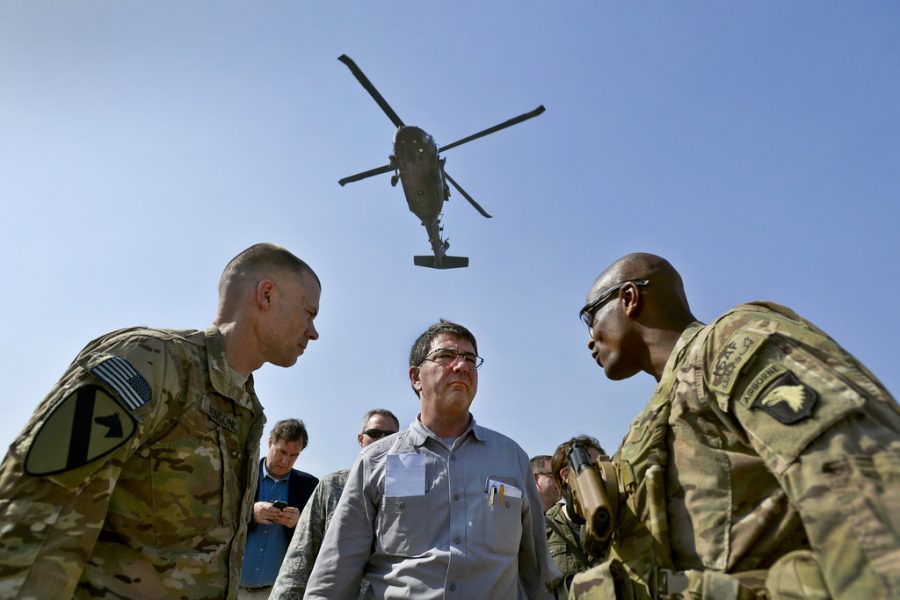The United States withdraws from Afghanistan, leaving Afghan people to face uncertain future
Courtesy U.S. Army via Creative Commons
As a Black Hawk helicopter rumbles overhead, Deputy Secretary of Defense Ashton B. Carter speaks with Brig. Gen. Ron Lewis, right, during a visit to bases in Afghanistan, May 13.
The recent withdrawal of U.S.troops from Afghanistan concludes a nearly decade- long conflict between the U.S. and Islamic extremist groups in the area. This decision has left many wondering what will happen next, both within the country and in terms of U.S. involvement in the region.
The U.S. began the process of withdrawal from the region in February 2020, when an agreement was signed between the U.S. and the Taliban. This agreement was based on the condition that the Taliban distance themselves from extremist groups like Al-Qaeda and others. However, in the months that followed the agreement, American intelligence agencies reported that this was not the case. The withdrawal was originally set to be complete in May 2021 but, for various reasons, was delayed.
At the end of August, President Joe Biden followed through on his predecessor’s decision. However, his haste during the last few months drew criticism, especially in the wake of the death of 13 U.S. service members. More issues arose, when many U.S. citizens were stranded in the country and thousands of Afghan refugees sought asylum in the U.S.
Seline Guner, a professor of political science and global studies at St. Edward’s University, answered some questions on where Afghanistan might be headed, and what this will mean for the Afghan people and the surrounding regions.
Q: Would a slower withdrawal have yielded better results?
A: “I think this is a long lasting process. Withdrawal will definitely lead to an imbalance in power relations in Afghanistan. A slower withdrawal would still cause new powers to emerge and new conflicts to arise. I guess this process is unavoidable,” Guner said.
Q: Would the Taliban reduce its human rights violations in order to gain some legitimacy on the world stage?
A: “I do not think that Taliban wants the approval of the world stage, at least not the western powers. On the contrary, they do view Islam from a very strict viewpoint and for them, human rights and women rights is a concept made up by the west to manipulate women. For them women should be ‘true followers of Islam’ and this should be their interpretation of Islam. They believe that women can only be free when they are free from Western manipulation and only when they follow Sharia Law.”
Guner also stated that we will see an increase in refugees fleeing the country, and that could potentially put stress on the economies of countries nearby. Here in Austin around 200 refugees are expected to be resettled by the end of the month, with more likely on the way.
Guner also noted that this development will potentially cause problems for nearby countries that have adopted more western cultures. This is because the Taliban is vehemently opposed to anything influenced by the west.
Q: What will the future look like for Afghan people? Are there any opposing forces within the country who could potentially challenge Taliban rule?
A: “We will need to wait and see for an organic opposition. This opposition should come from within to have real legitimacy among the people of Afghanistan. Yes, unfortunately, this process might be long and bloody; however, I believe that [the] people of Afghanistan will eventually have a government of their own which is based on equality and freedom.”
Although the situation has been getting worse over the past few weeks, there is still some hope for the Afghan people to move forward past Taliban rule without the influence of the U.S., though that process may be long and difficult. For now, it is still too soon to say.













Ron Cornell • Sep 21, 2021 at 9:38 am
A very well reasoned article constructed specifically to answer the views of the articles headline. Would enjoy reading an additional article dealing with expanded questions about the method of US withdrawal and the effects on various world powers and Afghans.